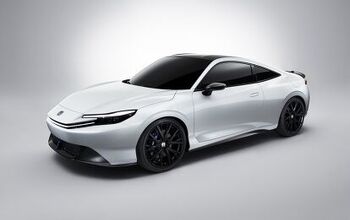Volkswagen Says ID Hatchback Will Look Like the Concept - Which Looks Like the Future

While the electric revival of the Microbus is the star of Volkswagen’s ID sub-brand, we shouldn’t ignore the importance of the upcoming ID hatchback. On track to enter production next year, the Golf-sized hatchback boasts pretty impressive specs for an battery electric vehicle. It won’t be the fastest or most-exciting EV on the market, but VW claims it will be capable of 250 to 375 miles of electric range and offered at an attractive price.
It’s an EV for the masses and should serve as the tip of the spear for Volkswagen’s electric offensive, along with the Crozz crossover. However, the automaker says mass-market appeal doesn’t have to include mass-market styling. The production version of the ID Hatchback should look like the futuristic concept.
“The proportions, the design cues and the wheel size are the same as the concept. It looks like the show car,” VW’s design head, Klaus Bischoff, told Autocar. “We couldn’t do the camera-system rear-view mirrors for legal reasons, nor the electric door handles due to cost. But other than that, it’s pretty much the same.”
That’s a little difficult to believe, as the rear-drive electric’s wheels are absolutely massive and the suspension looks to have about 2 millimeters of travel.
While it’s impressive that Volkswagen wants to adhere to the concept’s styling, there is no way the consumer model will have the same ground clearance, wild interior (with fully collapsible steering wheel), or color-changing headlamps.
However, the point isn’t so much that the production vehicle will look identical to the concept. It’s that the new hatchback will sets the visual tone and prove that the ID fleet is entirely separate from Volkswagen’s main stable — which sounds like the opposite of what Mercedes-Benz is doing with its EQ cars.
“We had the unique chance to lead Volkswagen into a new age,” Bischoff explained. “Electric drive provides greater freedom for designers. We minimise the cooling holes; the axes move further apart and generate stunning proportions.”
So far as we know, the ID Hatchback will keep its projected range (though the EPA will rate it lower than the claimed maximum of 373 miles) and use a 163 horsepower motor capable of getting the car up to 60 mph in just under 8 seconds. Top speed will be electronically limited to 99 mph.
How many battery configurations Volkswagen plans to offer at launch is unknown. We know it’s supposed to have longer- and shorter-range configurations, but specs haven’t been announced. Production will take place at an existing factory, as the car uses existing unibody construction techniques and is comprised primarily of steel, aluminum, and magnesium — like any normal car.
[Images: Volkswagen Group]

A staunch consumer advocate tracking industry trends and regulation. Before joining TTAC, Matt spent a decade working for marketing and research firms based in NYC. Clients included several of the world’s largest automakers, global tire brands, and aftermarket part suppliers. Dissatisfied with the corporate world and resentful of having to wear suits everyday, he pivoted to writing about cars. Since then, that man has become an ardent supporter of the right-to-repair movement, been interviewed on the auto industry by national radio broadcasts, driven more rental cars than anyone ever should, participated in amateur rallying events, and received the requisite minimum training as sanctioned by the SCCA. Handy with a wrench, Matt grew up surrounded by Detroit auto workers and managed to get a pizza delivery job before he was legally eligible. He later found himself driving box trucks through Manhattan, guaranteeing future sympathy for actual truckers. He continues to conduct research pertaining to the automotive sector as an independent contractor and has since moved back to his native Michigan, closer to where the cars are born. A contrarian, Matt claims to prefer understeer — stating that front and all-wheel drive vehicles cater best to his driving style.
More by Matt Posky
Latest Car Reviews
Read moreLatest Product Reviews
Read moreRecent Comments
- Golden2husky The biggest hurdle for us would be the lack of a good charging network for road tripping as we are at the point in our lives that we will be traveling quite a bit. I'd rather pay more for longer range so the cheaper models would probably not make the cut. Improve the charging infrastructure and I'm certainly going to give one a try. This is more important that a lowish entry price IMHO.
- Add Lightness I have nothing against paying more to get quality (think Toyota vs Chryco) but hate all the silly, non-mandated 'stuff' that automakers load onto cars based on what non-gearhead focus groups tell them they need to have in a car. I blame focus groups for automatic everything and double drivetrains (AWD) that really never gets used 98% of the time. The other 2% of the time, one goes looking for a place to need it to rationanalize the purchase.
- Ger65691276 I would never buy an electric car never in my lifetime I will gas is my way of going electric is not green email
- GregLocock Not as my primary vehicle no, although like all the rich people who are currently subsidised by poor people, I'd buy one as a runabout for town.
- Jalop1991 is this anything like a cheap high end German car?










































Comments
Join the conversation
I guess the future is a Nissan Leaf. . .
truckducken: Most of the "famed VW unreliability" is due to the never-ending de-fame-ation from you fanboys of other makers. The various yearly reliability ratings show up-and-down movement every year - and even St. Toyota is not always at the very top, much less Chevy, Hyundai, or Subaru. To the confirmed crankosaurus, nothing VW does could ever, possibly be good enough. Well, VW sales are up; read it and weep.